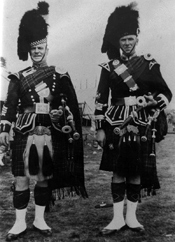The gold ring
 If you’re like most, your piping and drumming “career” depends heavily on the attitude of your partner towards your hobby-avocation-obsession. I’ve seen my share of players in misery, beaten down by an overbearing spouse who can’t appreciate that there’s more to their life than him/her. They’re “not allowed” to go to certain band practices, competitions or even glorious band trips. They tut-tut and tsk-tsk, and think of your bagpipe or drum as tantamount to you having an affair.
If you’re like most, your piping and drumming “career” depends heavily on the attitude of your partner towards your hobby-avocation-obsession. I’ve seen my share of players in misery, beaten down by an overbearing spouse who can’t appreciate that there’s more to their life than him/her. They’re “not allowed” to go to certain band practices, competitions or even glorious band trips. They tut-tut and tsk-tsk, and think of your bagpipe or drum as tantamount to you having an affair.
Screw that.
Ideally, as said before, you find a soul-mate who also plays the pipes or drum, or comes from a family of pipers or drummers. He/she already speaks the language of piping and drumming, and understands your affliction. These folks have hit the relationship jackpot but, sadly, that’s a rare situation. Most spouses at best just tolerate it and learn to live with the tension.
The erosion of a relationship can be a slow creep. I’ve seen pipers/drummers’ marriages start out all hunky-dory, their partner hanging out with the band, happily coming to competitions. But gradually things get rocky, and, instead of attending practices or contests, the piper/drummer is pressured to go shopping, or look after the kids, or even (shudder) stay home to do yard work or some other mundane thing. It can get very unpleasant.
But how can we recognize these incompatible people before we get in too deep? With a shout-out to the movie “Diner,” here’s a 10-question quiz that you can administer to your prospective life-partner in the early stages. Keep track of the answers, because at the end you’ll have to tally them to take an ultimate read of who or what you’re dealing with.
Good luck. This could be life-changing.
Our anniversary conflicts with the most important pipe band competition of the year. What do you do?
A) Call the pipe-major to tell him/her that I can’t make it.
B) Demand that I stay home to have a “cozy” night at home watching chick-flicks.
C) Recognize that my pipe band is a passion, too, and suggest we celebrate another time.
D) Invite yourself along on the band trip so that we can “make a weekend of it.”
I walk through the door after a three-day piping/drumming weekend, my uniform stinking of beer and vomit. Your response is:
A) Oh, my God, go somewhere else to clean up before entering my house.
B) It’s your turn to clean the house/take the kids, I’m going out.
C) So, did you have fun?
D) Silence.
My practicing woke up the baby, so you say:
A) How often do you really need to play that?
B) It’s okay, the little one will just have to get used to it.
C) The baby must have heard that missed D-throw in the third part.
D) Maybe we should we soundproof your practice room.
Feeling terrible, I call you to say that it was me who botched the attack in the contest, which made my band lose. Your response:
A) What’s an attack?
B) That’s okay; it’s only a competition.
C) Oh, wow, I’m really sorry that the band lost.
D) Which MSR was it?
I suggest that we have a piper at the wedding, so you say:
A) How much does that cost?
B) But I want a sweet violin sonata as I walk down the aisle.
C) Yes, let’s ask [best piper friend/family member] to play.
D) Do you think we can get someone really good?
I need a new suit for work, and I also need a new kilt for solo competitions, and we can afford only one. Your advice is:
A) Maybe you should get an extra job to support this piping/drumming obsession of yours.
B) Can you not wear a suit in competitions?
C) Get the very best kilt you can – it’s a lifetime investment, after all.
D) Maybe a great business suit will help you get that promotion so we can afford that new kilt.
You show up after practice with the entire band ready to party at your house. What’s your reaction?
A) Chain the doors and call the police.
B) Quickly hide all the breakables.
C) Run to the supermarket for ice and munchies – it’s going to be a great few days!
D) Call your friends to invite them over – in for a penny, in for a pound, after all.
I was away at a competition over the weekend and didn’t call or text you. You say:
A) Is it too much to ask that you call me to say you love me?
B) What, did you drop your phone in your pint again?
C) But I was dying to hear the result!
D) I was worried about you.
Who won the World’s in 1964?
A) The what?
B) How the &^%& should I know?
C) Why, the Edinburgh City Police at Ayr, of course.
D) Let me just check the pipes|drums Big Prizes database . . .
The holidays are approaching fast. What gift are you considering getting me as a gift?
A) Power tools so that you can finally install my new closet shelving system.
B) A “pass” that allows you to go to any competition you like.
C) Not sure, but I’ll ask your piping/drumming friends for suggestions.
D) A gift card for that other hobby of yours.
Now, then, let’s tally up.
For every “C” answer give yourself three points. These indicate that you’ve found an ideal piping/drumming spouse who understands the game and appreciates your passion. You’ll have no trouble with him/her as you merrily continue your avocation.
Score two points for each time you answered “D.” While these aren’t ideal responses, they do indicate someone with compassion and practicality, or who knows enough not to say anything, or takes an interest in what you do.
For each time you answered “B,” you can have one point. These answers are a bit insensitive and uncaring, but they indicate a minimal effort to understand your passion, or at least a sense of humour.
For every “A” answer score zero points. Even one of these horrific answers is an indication that you’re messing with a potential piping sociopath, so out of touch with who you really are, who will be nothing but trouble in the years ahead.
25-30 points = you have found the ideal piping/drumming soul-mate. Marry that person now, rest and be thankful.
15-25 points = definitely worth investing more time with. With training and gentle mind-melding, the right seasoning and a little more blowing-in time, he/she could be a keeper.
Seven-14 points = akin to getting the red light at the Northern Meeting: unnerving, and a serious sign that this just won’t be a good performance and even a breakdown could be a likely event.
Six or fewer points = uh-oh. You’ve got an enemy of piping/drumming on your hands. Either give the person the old, “It’s not you, it’s my pipe band . . .” speech, or steel yourself for a life of hen-peckery.
Of course, the mere act of having to administer this quiz would probably hasten the end of the relationship anyway, so if you’re even considering using it, you probably already know the truth.
Next: revised wedding vows for the piper/drummer.
 pipes|drums is all about creating constructive conversation and dialog, and I like to think that over the years many sensitive topics have seen sunlight after having been swept under the rug for ages. We’re getting there.
pipes|drums is all about creating constructive conversation and dialog, and I like to think that over the years many sensitive topics have seen sunlight after having been swept under the rug for ages. We’re getting there.


 The
The 
























